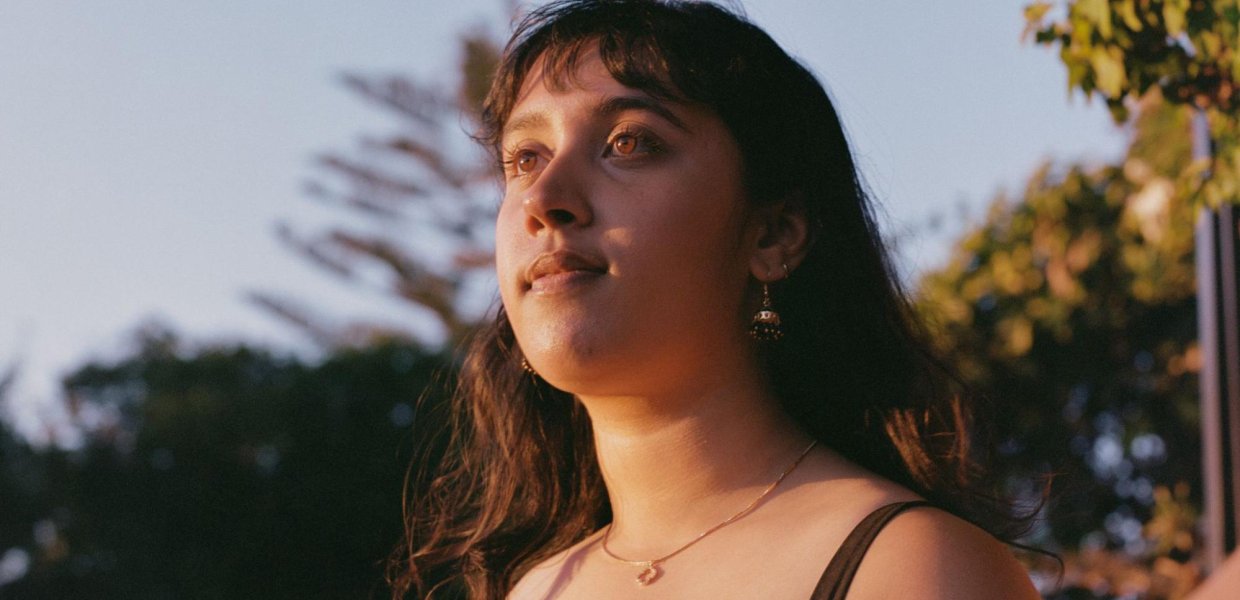Divya Subbiah doesn’t chase the spotlight — she looks for the stories hiding just outside of it. She gravitates toward the unconventional and the unassuming.
“I want to tell stories about people and ideas that aren’t normally focused on,” she said. “I’m interested in ideas of performance and truth, and am always looking for the ways people display their humanity and authenticity.”
A writer, filmmaker, editor and designer, Subbiah decided to begin the MA in Specialized Journalism (Arts and Culture) program because she wanted to carve out a creative and professional identity at the intersection of form, medium and message.
“For as long as I can remember, I’ve existed between fields, spaces and industries,” she said. “Storytelling is perhaps the true unifying factor.”
Her impulse to dig past the surface and seek the in-between has followed Subbiah since childhood.
Growing up in Silicon Valley, she remembers that while her peers enrolled in introductory programming courses, she was placed in writing classes. Her parents and a high school media arts program encouraged her to explore and take creative risks. So, she moved from words to images and into filmmaking — creating everything from stop-motion shorts to music videos — and discovered a love for collaboration and craft.
That passion led her to pursue a BFA at New York University. But, days before graduating in 2023, the Writers Guild of America strike hit. Subbiah found herself searching not just for work, but for clarity. She began writing more — on her blog and for Periphery Magazine, an online publication focused on arts and culture.
“I realized I enjoyed criticism and journalistic writing, but felt both inexperienced and unqualified for jobs in the field,” she said.
As she considered whether earning a graduate degree might be the answer, she found USC Annenberg’s specialized journalism program offered something rare: a small cohort model, customizable curriculum and hands-on instruction — all of which provided space for her to synthesize her existing talents while acquiring new skills.
“This program has allowed me to meld all of my interests together,” she said. “And more than that, it’s taught me how to grow more confident in each of them.”
Subbiah admits courses like USC Annenberg’s “Arts Criticism and Commentary” and “Organizing Creativity: Entertainment Industry Decision Making” at the USC School of Cinematic Arts have forced her to grow as a writer and a creative.
“While I had a decent understanding of my voice and who I am as a person and an artist prior to coming to USC, I had to reconsider my writing style and priorities, causing me to grow immensely in a way that can only strengthen my ability to make a real impact in the world.”
Her thesis project looks at the past, present and future of movie theaters. Beyond tracing the evolution of cinemas through industry trends and economic shifts, she delves into the emotional experience of communal viewing.
“I’m most interested in why people connect in theaters,” she said. “What makes them meaningful spaces, and what do those connections tell us about ourselves?”
She has also continued to pursue creative projects outside of the classroom. At USC, Subbiah has served as co-editor of Ampersand, the student-run arts and culture magazine and participated in immersive fieldwork — including a trip to the Sundance Film Festival.
“The atmosphere was electric,” she said. “I not only had a rare and wonderful opportunity to immerse myself in the world of a working critic, I also grew a lot as a writer.”
Last year, alongside longtime collaborator Isaiah Vivero-Ha, she co-founded Boxer & Baker Productions, a production company aimed at supporting underrepresented artists and overlooked stories.
“We know how difficult it is for emerging filmmakers to break in,” she said. “And we wanted to create a space not only to tell our own stories, but to help others do the same.”
As she prepares to graduate on May 16, Subbiah is optimistic about the future of arts journalism that she will help shape.
“There is a true need for good journalism that I don’t see subsiding any time soon,” she said. “How it looks might just differ depending on how the industry and world evolve.
For now, she will return to the Bay Area to complete production on a documentary project, “When Are You Coming Home?” Eventually, she plans to return to Los Angeles — a city that has begun to feel like home.
“Around this time last year, I had committed to USC but was frankly terrified to actually start the program here,” Subbiah said. “It felt, in many ways, like I was leaving a life and community that I’d built for years behind. I quickly learned, though, that I didn’t leave anything behind.”
